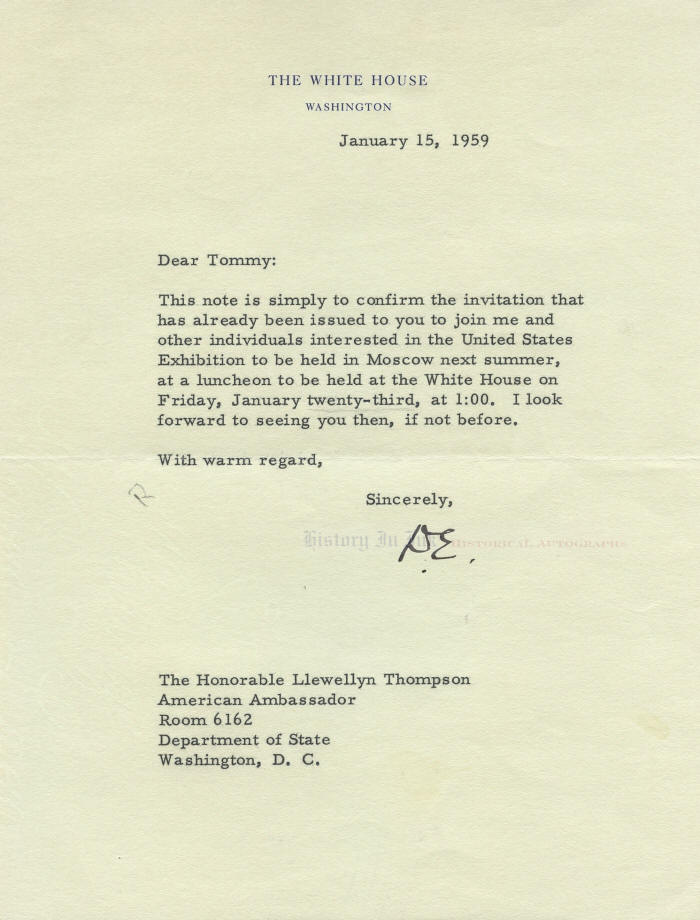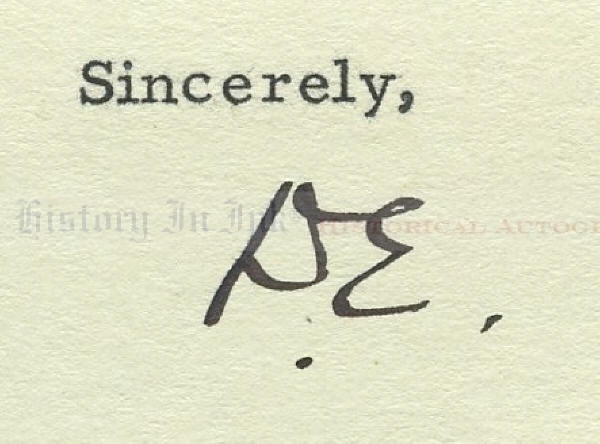

1403305
Dwight D. eisenhower
From the Estate of Llewellyn E. Thompson,
United States Ambassador to the Soviet Union
Eisenhower personally invites Thompson to discuss the upcoming United States Exhibition in Moscow,
where the famous “Kitchen Debate" between Richard Nixon and Nikita Khrushchev would occur
Dwight David Eisenhower, 1890-1969. General of the Army; Supreme Commander, Allied Expeditionary Force, World War II; 34th President of the United States, 1953-1961. Typed Letter Signed, D.E., one page, 6¾" x 8⅞", on stationery of The White House, Washington, [D.C.], January 15, 1959.
President Eisenhower personally invites Ambassador Llewellyn E. “Tommy" Thompson, the United States ambassador to the Soviet Union, to discuss the upcoming American exhibition in Moscow. He writes, to “Dear Tommy,” in full: “This note is simply to confirm the invitation that has already been issued to you to join me and other individuals interested in the United States Exhibition to be held in Moscow next summer, at a luncheon to be held at the White House on Friday, January twenty-third, at 1:00. I look forward to seeing you then, if not before. / With warm regard . . . .”
The American National Exhibition would be the site of the famous “Kitchen Debate" between then-Vice President Richard Nixon and Soviet Premier Nikita Khrushchev. The exhibition was the United Statesʼ contribution to the countriesʼ mutual cultural exchange. The Soviet Union held a trade show in New York in 1958, and Nixon represented the United States at the ribbon cutting to open the American counterpart, an exhibition at Moscowʼs Sokolniki Park, on July 24, 1959. The exhibition included a complete house that the exhibitors said any American could afford. It was filled with labor-saving and recreational devices intended to showcase capitalism and the high American standard of living. As Nixon and Khrushchev toured the house, they began a series of impromptu hard-hitting ideological debates that covered the range of Soviet-American relations—the threat of atomic war, diplomacy by ultimatum, and economic progress.
The most notable exchange occurred in the model Betty Crocker kitchen. Khrushchevʼs son Sergei, now a naturalized American citizen, recalled that Khrushchev and Nixon “go to this kitchen, and Nixon talks about American achievement and my father talks about Soviet achievement. They argue with each other about which system is better." The two saw the world through the lens of the kitchen. Khrushchev said, “On political problems, we will never agree with you. For instance, Mikoyan [Soviet statesman Anastas Mikoyan] likes very peppery soup. I do not. But this does not mean that we do not get along." Nixon replied, “You can learn from us, and we can learn from you. There must be a free exchange. Let the people choose the kind of house, the kind of soup, the kind of ideas that they want."
The Kitchen Debate was the first high-level meeting between American and Soviet officials since the 1955 Geneva “Big Four" Summit. Khrushchev was impressed with Nixonʼs tough mindedness and strong will. The debate did much to increase Nixonʼs standing as a statesman and increase his chance of obtaining the 1960 presidential nomination. Khrushchev later said that he did everything he could to make Nixon lose, as he did, to John F. Kennedy in 1960.
As the United States Ambassador to the Soviet Union, Thompson accompanied Nixon and stood with him as Nixon cut the ribbon to open the exhibition.
Thompson (1904-1972) was a career American diplomat who served as Ambassador to the Soviet Union under Presidents Eisenhower, Kennedy, and Lyndon B. Johnson. Thompson joined the Foreign Service in 1928, and during his long and distinguished career he served as the United States Ambassador to Austria from 1955 to 1957 before Eisenhower appointed him Ambassador to the Soviet Union in 1957. Kennedy reappointed him in 1961. He resigned in 1962, but Johnson reappointed him in 1967, and he served until 1969. He served at a critical time in history. He was part of the Executive Committee of the National Security Council, or ExComm, which advised Kennedy during the Cuban Missile Crisis in 1962, and he was present at Johnson's summit with Soviet Premier Alexei Kosygin at Glassboro, New Jersey, in 1967. He came out of retirement to advise President Nixon on the Strategic Arms Limitation Treaty (SALT) negotiations with the Soviet Union and represented the United States in the SALT talks from 1969 until he died in 1972.
This letter is in fine to very fine condition. It has one horizontal mailing fold and light toning at top edge. The words "twenty-third" are lightly underlined in pencil, and there is a light pencil notation “R" in the blank left margin, not touching the text. Eisenhower has signed in black fountain pen.
Provenance: This letter comes directly from Ambassador Thompson's estate. We are pleased to be able to offer it for the first time on the autograph market.
Unframed.
_____________
This item has been sold, but
click here to see other
Presidents and First Ladies items
that we are offering.



